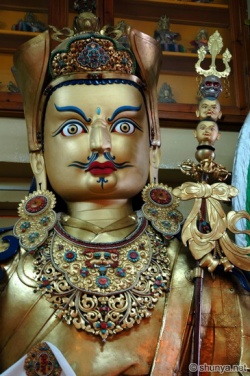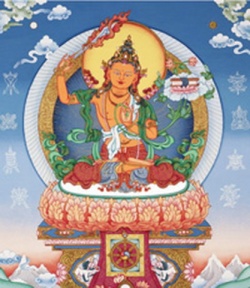Habitual tendencies
kun gzhi la bag chags bzhag cing - placing habitual tendencies in the all-ground [RY]
sgrib gnyis bag chags dang bcas pa - the two obscuration along with their habitual tendencies [RY]
sgrib pa - Obscurations. The veils that covers one's direct perception of the nature of mind. In the general Buddhist teachings several types are mentions: the obscuration of karma preventing one from entering the path of enlightenment, the obscuration of disturbing emotions preventing progress along the path, the obscuration of habitual tendencies preventing the vanishing of confusion, and the final obscuration of dualistic knowledge preventing the full attainment of buddhahood [RY]
dngos por zhen pa'i bag 'chags - the habitual tendencies of clinging to things as real [RY]
snga ma'i bag chags kyi dbang gis - due to the power of former habitual tendencies [RY]
gnyis 'dzin gyi bag chag - habitual tendencies for dualistic fixation [RY]
rten cing 'brel bar 'byung ba'i tshul bcu gnyis - twelve modes of dependent origination. 12 links of interdependent arising. These are ignorance {ma rig pa} or avidya, habitual tendencies {'du byed} or samskara. consciousness {rnam shes} or vijnana. name and form {ming dang gzugs} or nama rupa. the six activity fields {skye mched drug} or shadayatana. contact {reg pa} or sparsha. feeling {tshor ba} or vedana. craving {sred pa}. the five basic components {nye bar len pa}. rebirth {srid pa}. birth {skye ba} and old age & death {rga shi} [RY]
'du byed - samskara, formation; 1) One of the five aggregates: formation, Def. Jamgön Kongtrül: {rkyen rnams tshogs shing 'dus pas sems yul lam dmigs pa la mngon par 'du byed pa dang yul sna tshogs la g.yo zhing skul bar byed pa'i bdag nyid can gyi sems pa'o}. 2) One of the twelve links: formative forces, karma-formations, habitual tendencies. mental exertion, thought formation. Def. Jamgön Kongtrül: {ma rig pa'i dbang gis kun gzhi la las kyi sa bon 'debs pa byed pa 'du byed kyi byed las, kun gzhi'i steng du las kyi bag chags 'debs par byed pa'i rgyu, bsod nams kyi las, bsod nams min pa'i las, mi g.yo ba'i las rnams so} // application; to form, make, gather; volition, act of will, impulse, karmic formation, "that which brings about", to gather, bring, produce; act of conditioning; application; combination; samskaras, impulses, karmic formations, application, compositional factors. concepts and ideas, all emotions, to form, make, gather, compositional/ formative factor; karmic patterning karmic propensity [RY]
rnam pa nyi shu byang chub pa - Twenty Ways In Which The Body Is Enlightened. According to Nyoshul Khen Rinpoche, this refers here to the ten aspects of renunciation and the ten aspects of realization which pertain to the ten bodhisattva levels (bhumis). The term may also refer in Madhyamaka to the fourfold view of self {bdag lta bzhi} which applies to each of the five components of form, feeling, perception, habitual tendencies, and consciousness, and in the context of the vehicles of secret mantra, it may refer to accomplishment in twenty specific exercises pertaining to the experiential cultivation of the energy channels, currents and seminal points within the body. [GM] [RY]
'pho ba'i bag chags kyi dri ma - defilement of the habitual tendencies of transition [RY]
bag chag gyi sgrib pa - Obscuration of habitual tendencies. The propensity for apprehending attributes occurring in the mind of even highly developed bodhisattvas [RY]
bag chags - habitual tendency, karmic traces, karmic residues, unconscious propensities, (vasana); disposition, habit energy, thought, habit formation, habit thought dormant, potential tendency, habitual pattern, habitual propensity, habitual sleep, habitual tendency, impression, imprint, inclination, inherent tendency, inveterate tendency, karmic impression, karmic imprint, karmic propensities, habitual tendencies, imprints, predispositions; karmic traces, latency, latent predisposition, latent tendency, latent, dormant, mental imprint, negative psychic imprint, potency, potential tendency, potentiality, predisposition, propensity, propensities, sediment of impressions. Syn {nus pa} habitual patterning [RY]
bag chags - vasana, karmic (traces, residues, impressions), unconscious (inclinations, dispositions, habituations, propensities, tendencies, predispositions), past experiences, experience potentialities, (inveterate, habitual, basic, unconscious) tendencies, experiential traces, habitual working of ignorance, experientially initiated potentialities of experience, (includes both input and feedback, almost sa bon, not the thing initiated), habit patterns, latencies, habit, instinct, tendential imprints, tendential impressions, ingrained predispositions, latent inclinations, stubborn habits, latent inclinations, habitual pattern, habitual tendencies, karmic tendencies [JV]
bag chags kun spangs pa'i ye shes - the wisdom pf having relinquished all habitual tendencies [RY]
bag chags kyi sgrib pa - the obscuration of habitual tendencies; obscuration of habit [RY]
bag chags kyi nyon mongs pa - the habitual tendencies of disturbing emotions [RY]
bag chags kyi lus - the body of habitual tendencies [RY]
bag chags btab pa - sowing / planting habitual tendencies [RY]
bag chags gzhan dbang - the dependency of habitual tendencies [RY]
bag chags bzhi - the four types of habitual tendencies: {mngon brjod kyi bag chags, bdag lta'i bag chags, srid pa'i yan lag gi bag chags, rigs mthun pa'i bag chags} [RY]
bag chags yang dag bcom pa - perfectly overcoming habitual tendencies; one of the categories of {zag med ye shes sde tshan nyer gcig} [RY]
ming bzhi la ldan pa'i ting nge 'dzin - Four Names, the Contemplation endowed with. These are the four mental components of feeling, perception, habitual tendencies and consciousness which are separated from the fifth component, form, during the four formless absorptions at the summit of existence in samsara [RY]
mtshan 'dzin gyi bag chags - the habitual tendencies of apprehending attributes [RY]
yid kyi lus - Mental body. An immaterial body formed of habitual tendencies, quite like the imagined physical form we have while dreaming [RY]
rang gi ma rig pa' bag chags - one's habitual tendencies of ignorance [RY]
sems tsam pa - Mind-Only School, Chittamatra. A Mahayana school of Buddhist philosophy propagated by the great master Asanga and his followers. Founded on the Lankavatara Sutra and other scriptures, its main premise is that all phenomena are only mind, i.e. mental perceptions that appear within the all-ground consciousness due to habitual tendencies. Positively, this view relinquishes the fixation on a solid reality. Negatively, there is still clinging to a truly existing 'mind' within which everything takes place [RY]


